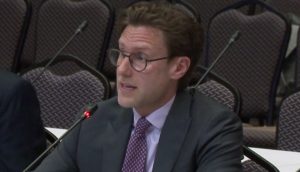For newly minted CBC/Radio-Canada president and CEO Marie-Philippe Bouchard (pictured), the political and economic uncertainty swirling in Canada represents why the national public broadcaster is more necessary than ever.
“We are an instrument of culture and democracy,” Bouchard tells Playback Daily, MiC’s sister publication, following her appearance at Prime Time in Ottawa last Friday (Jan. 31). “We sustain those two pillars of our society, but we also play a very big role in our economy. As we get into those big shifts, it’s important to remember that … in this uncertain climate that we’re in.”
The conversation took place moments after reports surfaced that U.S. President Donald Trump had confirmed he would be placing tariffs on Canada on Feb. 1. That day, Trump signed an executive order for 25% tariffs on Canadian goods into the U.S., and 10% on oil and energy, effective Tuesday, Feb. 4. At press time reports had stated Trump and Trudeau were in talks on Monday regarding the tariffs, following Trudeau’s announcement that Canada would immediately retaliate with 25% tariffs on $30 billion worth of U.S. goods.
During her closing session at Prime Time, Bouchard told Canada Media Fund president and CEO Valerie Creighton that Canada is “in a psycho-drama” between the looming tariffs and threats of becoming the “51st state.”
“I am an opportunist,” she told Creighton. “I think in every crisis there’s an opportunity and I see the will to come together and to stand up to threats … for Canadians, it’s time to have that conversation.”
Bouchard emphasizes that it’s too soon into her tenure to discuss specific strategies, but she equates her immediate priorities to “renewing the lease” and “redecorating.” In other words, ensuring CBC maintains its funding from the federal government and modernizing the organization.
“There’s a revolution in terms of technology, consumer habits, the advertising market and the platforms on which people consume content,” she says. “There’s so much change going on, it’s really important that an organization that is, at its core, there to serve the Canadian public anticipate those changes and adapt to them.
“It’s not just maintaining a status quo, it’s about transforming and continuing to meet Canadians’ needs.”
One tool that was meant to support CBC/Radio-Canada in its transformation was a new mandate from the Department of Canadian Heritage. Bouchard was part of the advisory committee selected by Canadian Heritage to review the pubcaster’s mandate, which she clarifies was before she was ever put forward as a candidate to succeed former president and CEO Catherine Tait.
The mandate has not been tabled at press time, and Parliament is currently prorogued until March 24 as the Liberal Party seeks a new leader. Conservative, NDP and Bloc Québécois leaders have all indicated they will use a non-confidence vote to trigger an election once Parliament is back in session. “I don’t know if there will be a runway [to table the mandate] or not, and I suspect [Heritage Minister Pascale St-Onge] doesn’t know either,” says Bouchard.
“We were hoping for that [committee] work to actually lead to some specific changes,” she adds, without delving into the specifics of the committee’s work. “How that is going to happen and what comes next is for Canadians to decide [in the next election.]”
For now, Bouchard is hitting the road to meet with Canadians across Canada to hear about how CBC/Radio-Canada can meet their needs. She told Creighton she has met with people in Montreal, Toronto and Ottawa so far, and will be visiting Vancouver, Edmonton and Regina next.
“It’s really about going where people live and work and hearing from people we don’t hear a lot from directly, like civic leaders, [business leaders] and community leaders, and also the public … that listens and the ones that stopped listening,” she says. “We need to hear all of those voices.”
This article was originally published on PlaybackOnline.























